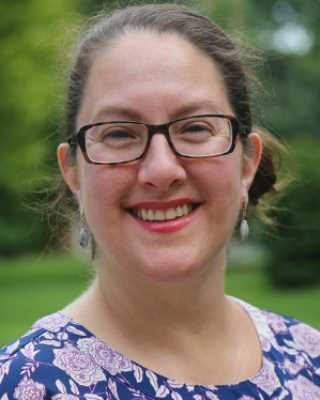Julia Schiavione Camacho is now in her second semester as an associate professor of history at Goshen College. Schiavione Camacho grew up in Tucson and studies Borderlands history. She taught at the University of Texas El Paso before teaching at Antioch College in Ohio.
How did you find Goshen College?
I’ve always been drawn to the idea of teaching at a Christian school. I’m Catholic, and some schools that I found are sort of more narrow in what they accept, and that’s fine. But one thing that immediately struck me is that it’s a Christian college, specifically Mennonite, which I didn’t know a whole lot about.
I was really drawn to the college’s focus on accepting all faiths. That was just really nice.
Tell me about living in Tucson.
Well, it’s been a long time since I’ve been in Tucson, actually. But my family’s all there. In my family we cross the border back and forth. I have family in Sonora, and they used to come to Tucson.
We traveled several times a year to visit family, and every Easter for the whole week — for Mexican Catholics, Semana Santa, or Holy Week is really important.
It wasn’t until later that I thought back on those things and realized that they really shaped me: crossing back and forth, places, language.
This is, I think, one thing that led me to study Borderlands history.
Tell me about Borderlands history. As a field, what are people studying?
So comparative Borderlands is one area that has been growing, it seems. For a while, it was just regional borders. The U.S.-Mexico border, for example. But more recently, there’s been more of a focus on comparison. So you can look at U.S.-Mexico, but you also have to look at the U.S. and Canada border, right. And then compare the borders around the world, what they look like, how they are different or similar.
My work is more Asians in Latin America, and the Trans-Pacific, but border crossings are still part of it. The U.S.-Mexico borderlands always sort of figures into it. And I’ve increasingly seen Hong Kong and Macau and Huambo in China as a sort of little borderlands, because [there’s] Macau and Hong Kong, former colonies, one Portuguese, one British, and then there’s mainland China.
Those are the two borderlands that kind of figure in my work.
How do you see the same themes of immigration and borders in a different way here in the Midwest from when you were living at the Southern border?
I’d heard this before I came here for my interview, and now being here a few months, it’s like, Goshen is a Latino community.
There’s a lot of nice interaction and cross-cultural community ability that I haven’t always seen in other places. It’s an interesting community.
And this is what happens in a lot of communities and with a lot of immigrants — It’s true with Chinese immigration — there’ll be chain migration. One person will come and then send money back. And because that person’s here, a cousin comes. It makes sense, right? This happened with the Irish immigrants too, I mean, it’s a kind of common set of experiences.
As someone who’s grown up Catholic, what’s it like entering into a Mennonite community?
It’s been really interesting. Well, there are a lot of Catholics here too. But Goshen has a Mennonite history and tradition and it’s been really nice to learn; I didn’t know very much. But now I know the story of Menno and — Am I saying that right? — And Dirk, and I mean, the stories that are really kind of interesting and meaningful.
As a historian, how do you think about the future?
This is something I’ve been thinking about a lot. I think we sometimes take what’s happening right now too seriously.
We’re part of this bigger picture, this broad sweep, and things tend to move back and forth and in new, nuanced ways.
And there are things that deserve to be taken seriously. I do think there are things that are scary. I mean, if I just think about technology, I feel a little uncomfortable, you know.
But when I begin to become upset or scared about lots of different things that are happening, I try to think that our moment is maybe not as meaningful as we might think.
This conversation has been edited for clarity and length.



